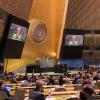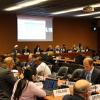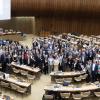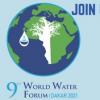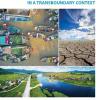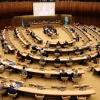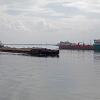Press Releases
Displaying Results 26 - 50 of 146
Italy and Kazakhstan have committed to reinforce action to uphold human rights to water and sanitation for all by joining the UNECE/WHO Europe Protocol on Water and Health, at the milestone UN Water Conference in New York.
Hungary, as Chair of the Protocol, also shared its commitment
As leaders gather in New York for the milestone UN Water Conference, Nigeria has taken a decisive step for cooperative water action by officially becoming the 48th Party to the Convention on the Protection and Use of Transboundary Watercourses and International Lakes (known as the UN Water
40 countries, regional integration and international organizations, international financial institutions, NGOs, academic and research centers have made a united call at the United Nations 2023 Water Conference to step up global efforts for transboundary water cooperation.
A joint
When leaders gather in New York on 22-24 March for the first major UN Water Conference in almost 50 years, the world must not miss the opportunity to secure greater cooperation on shared waters – which account for some 60% of global freshwater flow – as a prerequisite to address the global water
Today, following the example of several countries in the region, Niger officially confirmed its desire to accede to the United Nations Convention on the Protection and Use of Transboundary Watercourses and International Lakes, more commonly known as the Water Convention. This upcoming accession is
While freshwater and marine specialists have largely worked in silos, nature has always worked as one: the land, freshwater, and ocean ecosystems are closely interlinked and interdependent. So must be their management.
Bringing together the freshwater and ocean communities, the Global
A new step was taken by Panama in its process to join the Convention on the Protection and Use of Transboundary Watercourses and International Lakes (Water Convention) with the organization of a national workshop on 6-7 December, which gathered more than 60 stakeholders to identify priorities for
With water stress on the rise in shared river basins and aquifers, over 30 governments and organizations decide to join forces to push for greater cross-border water cooperation.
This year's terrible floods and droughts in almost all corners of the planet illustrate the critical importance
Global biodiversity is now declining faster than at any time in human history. As leaders gather for the 15th Conference of Parties to the Convention on Biological Diversity (COP-15, 7-19 December), UNECE calls for the region to urgently step up with the leadership needed to stop biodiversity loss
The United Republic of Tanzania, which shares seven out of its nine river/lake basins with neighboring countries, is taking an important step towards stronger cross-border cooperation for sustainable water management by advancing its accession to the Convention on the Protection and Use of
How can the universal rights to water and sanitation be achieved in a region, which according to the latest World Meteorological Organization report, is heating up faster than anywhere else in the world? How can increasing the resilience of water and sanitation infrastructures be reflected in pan-
Speaking at two events on water security at COP27 in Sharm el-Sheikh today, UNECE Executive Secretary Olga Algayerova stressed the importance of cooperation between countries for successful climate change policies and actions, especially when it comes to addressing water security. Impacts
The Dominican Republic has taken important steps to ensure the sustainability of its natural resources through better conservation, management and sustainable use of its transboundary waters. The Dominican Government undertook a process to accede to the United Nations Water Convention.
The
Cameroon became the 47th Party to the United Nations Convention on the Protection and Use of Transboundary Watercourses and International Lakes (Water Convention) following the approval of accession at the highest level by the Cameroon President on 7 July 2022 and the deposit on 1 November 2022 by
New assessment reveals progress on air quality and protected areas, but calls for urgent action to tackle emissions, waste, pollution and biodiversity loss
A circular economy and sustainable infrastructure offer solutions
Despite progress in certain areas, governments in
Nigeria has taken a significant step towards ensuring the sustainable management of its cross-border waters with a milestone commitment to join and implement a United Nations treaty known as the Water Convention.
This commitment, guided by a road map, will be the key outcome of the
More than 3 billion people depend on water that crosses national borders. As climate impacts – from drought to flooding – are felt more and more acutely worldwide, and with rising demands, pollution and tensions threatening increasingly scarce water resources, cooperation on shared waters
From insufficient drinking water supply to contamination by sewage overflow and disease outbreaks from improper wastewater treatment, existing risks from climate change to water, sanitation and hygiene in the pan-European region are set to increase significantly, UNECE and the WHO Regional Office
Representatives from the water, energy, and environment sectors of Bosnia and Herzegovina, Montenegro, and Serbia - the three riparians of the Drina River Basin - met on 4 May 2022 to discuss ways forward on sustainable development and transboundary cooperation.
The meeting of the Steering
The centrality of transboundary water cooperation for peace and sustainable development has been stressed in recent years at the global and regional levels, notably in the Sustainable Development Goals, at the United Nations Security Council, and at the African Ministers’ Council on Water.
However
Uganda has 98 per cent of its water resources within the Nile River Basin. The Nile River is the longest transboundary river in Africa. Cooperation on the Nile Basin water resources, according to Uganda’s Minister for Water and Environment, His Excellency, Hon. Sam Cheptoris, is therefore “not a
Which users may use how much water of a river, lake, aquifer or other source? For what purposes, where and when?
These are the questions which a new Handbook on transboundary ‘water allocation’–which is the process and/or outcome of determining how different stakeholders use water–published under
Global estimates for financing needs for water-related investments to achieve Sustainable Development Goal 6 on water range from $6 .7 trillion by 2030 to $22.6 trillion by 2050, according to the OECD. Investments are needed not only to build new infrastructure but also to maintain and operate
Can the oft-shared, yet increasingly scarce and most precious, resource that is water be a source of cooperation, rather than of conflict, among countries? If so, then how? As climate change brings prolonged droughts and more intense floods, how will Governments cope together? More than 20
Togo is the fifth country outside the pan-European region to accede to the Convention on the Protection and Use of Transboundary Watercourses and International Lakes (Water Convention), for which UNECE ensures the Secretariat. This comes as more and more countries – especially in Africa –are


